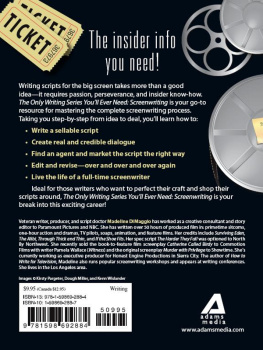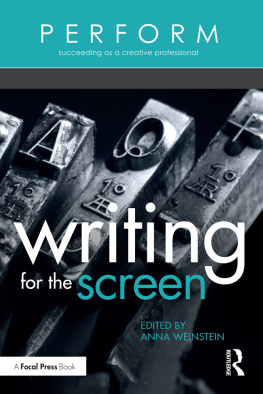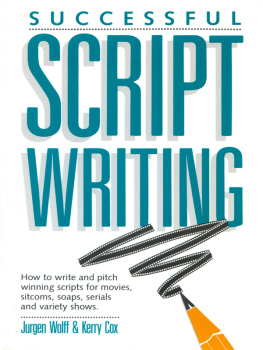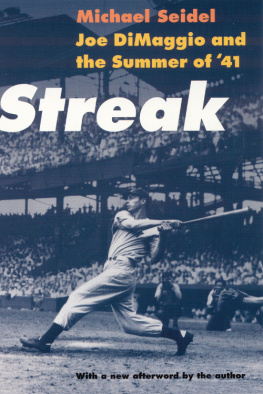All rights reserved, including the right to reproduce this book or portions thereof in any form whatsoever. For information address Fireside Subsidiary Rights Department, 1230 Avenue of the Americas, New York, NY 10020.
FIRESIDE and colophon are registered trademarks of Simon & Schuster, Inc.
TV IS WHERE ITS HAPPENING. Its where the money is, where the jobs are, where product is pumped out fast, and where writers have the privilege of seeing their material produced. This isnt necessarily so in films, where the process is very slow and the writer can be a one-hit wonder.
According to Writers Guild of America statistics, TV jobs outnumber film jobs by two to one. There are about four hundred movies made a year, and about three thousand television episodes. In television, if writers can find a way in, if they have the talent and know how to play it, they can go from a freelancer to a staff position, to story editor, to producer/creator, and even rise to the pinnacle of television, the showrunner. It happens; one of my former students even managed to pick up four Emmys along the way. And there are others who have achieved success. They have wonderful stories, some of which I will share with you.
I dont take credit for their success. It doesnt validate me as a teacher: they had what it takes. But their success validates what I believe inthat achieving dreams does happen.
The business of television has changed since this book was first written, and I have changed as well. I continue to write, and I have sold movies to cable and television and sold two feature films. Im currently attached to numerous projects, have a number of screenplays under option, and continue to teach. My screenwriting workshops have taken me to colleges and universities across the country, and farther. Ive taught soap writing in Finland, where conflict is considered disrespectful (try that one!), and sitcom writing to the Chinese who dont speak a word of English (that ones even better!). My favorite workshops are the small private ones, where I work with writers in helping them develop their scripts. Getting to know my students and watching them grow as writers has made teaching a very satisfying part of my life.
Many of these writers are on their fifth and sixth screenplays. They get better with each script. If I see a project I think has market appeal, I will try with all my power to help them find access.
Two years ago I joined forces with another writer/producer, Joanne Storkan, and we formed the banner Honest Engine Films. I see the market from a different perspective nowfrom both the buyers and sellers point of view. Ive become one of those people who too often says, Im sorry, we have to pass. I hate saying those words, because I know how the writer feels on the other end. But producing has given me many new insights, which I have shared with my students and will share with you throughout this book.
I make no false promises about this business. Lets face it: deciding to make a living by writing television scripts is not often a practical or easy career choice.
Television agent Mitch Stein, whom I interview later in the book, told me that when he speaks at conferences he likes to sit at the end of the dais, so when they finally get to him and ask his advice, he can tell everybody in the room, Go buy a bus ticket and get out of town. Someday you will thank me for it.
Consider this:
The Writers Guild of America, West, and Writers Guild of America, East, together represent about 11,000 members, about half of whom work in a given year. According to Chuck Slocum, Assistant Executive Director who tracks all the numbers for both Guilds, out of the working half of the membership, the median income from writing over a five-year period is $62,000 per year.
There are about 3,000 episodes of television written each year. Almost all of them are written by staff writers. On average a series has about a dozen writers. Now for the good news.
It can be doneyou can break into television writing. It happened to me; its happened to some of my students. The industry is full of writers who somehow managed to buck the odds. Not all of these writers are related to somebody, nor did they all begin with contacts. Some of them lived outside the LA area. Their stories are as diverse as their personalities and the TV shows they write for. But the writers did all have one thing in commongood ideas, well-written spec scripts, and some knowledge of marketing. The spec scripts were their calling card. They opened doors to an eventual sale.
THE STORY OF KEVIN FALLS
I met Kevin in Los Altos, California, at Foothill College. It was one of my first college classes. He was a journalism major from Cal Poly. He had wonderful energy and enthusiasm and didnt miss a beat. I read his first screenplay; it was quite good, and I could tell that he had talent. The script didnt sell, but in the marketing process, Kevin found an agent. He kept writing. He completed his second screenplayit also didnt sellbut he kept writing. One day I got a call from him. He was angry and distraught. He had three completed screenplays to his credit and still no bites. I completely understood his frustration, but I had a feeling he wouldnt give up.
About six months later I heard from him again. He called to tell me he had just signed a four-picture deal with Disney Studios. An executive there, a woman whom I came to know later, had read one of his scripts. She was not interested in buying the script, but she loved the way it was written. She called Kevins agent and asked to read more. The agent sent down those two other scripts that had never sold. Again, for various reasons, she didnt buy the scripts, but she found the writing wonderful. It was not only consistent, but Kevins style was perfect for the Disney genre. He was immediately placed under contract.
I saw Kevin a number of years later at a writers conference in Hawaii where I was speaking with Kathie Fong Yoneda, a former executive at Disney Studios.
Kevin, at the time, had just signed on to write the Pretty Woman sequel, a project that later was shelved because of casting problems, and he, at the moment, was writing the movie The Temp . During the Q & A, a young hopeful asked Kevin how many spec scripts he had written before he sold one. Kevin responded, Seven. The kids mouth dropped open. He asked what kept him going, and Ill never forget Kevins answer. He said he was getting on the Bayshore freeway, and asked himself the same thing, What if I never sell a screenplay? And he got the answer. It doesnt matter. Ill just leave them to my kids. I love it so much Im going to keep on writing anyway.
I kept track of Kevins career because his name kept popping up on the television screen, and I saw him year after year picking up Emmys.










